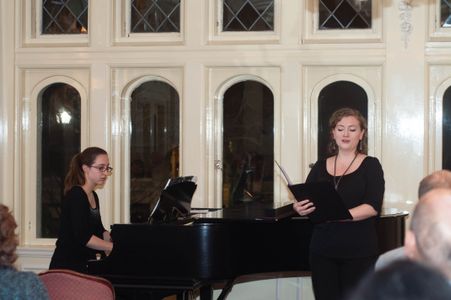Memories of World War I
 As if from a cave, the voice of Dashon Burton reaches up into the light of the BU Castle, singing the words of the past.
As if from a cave, the voice of Dashon Burton reaches up into the light of the BU Castle, singing the words of the past.
“If I should die, think only this of me: that there’s some corner of a foreign field that is forever England…”
The words are the opening lines of the poem “The soldier” by Rupert Brooke, written in the dazed aftermath of World War I. A century ago this year, that war broke out, and with its bloody conclusion shaped the destiny of the world in the twentieth century and beyond. On Dec. 11, the Center for the Study of Europe at the Frederick S. Pardee School of Global Studies at Boston University commemorated the opening of World War I with a symposium and chamber music concert that examined the history from new perspectives.
“Somewhere in the vicinity of 9 million people perished in this war,” said Prof. William Keylor, who spoke at the event. “Almost everyone involved thought, at the beginning, that it would be a short war. But the combination of machine gun firepower and heavy artillery resulted in a stationary war where, for years, the only thing that changed were the casualty figures.”
The day-long event was organized with the assistance of the International History Institute. it contained three panel discussions; War and Diplomacy, Remembrance, and The Arts, along with a concert by vocal chamber ensemble Gamut.
Speaking at the event were Pardee professors Keylor and Erik Goldstein, professor of International Relations and History. Goldstein opened the event by discussing how the diplomatic decisions made in the last days of the war shaped the modern Middle East.
“The Middle East is a landscape littered with dead empires,” Goldstein said. “What isn’t often remembered is that two of those empires which had an enormous impact were the British and French empires.”
Goldstein explained how the Sykes-Picot Agreement, where Britain and France carved up the former Ottoman Empire’s territory into nations like Iraq and Syria whose borders persist today, and the Balfour Declaration, which vaguely promised British support for a Jewish home in Palestine, were made in the interest of securing wartime alliances but had permanent ramifications for the residents of the region.
 “Drawing borders around new nations created barriers that had never existed, which led to the consequence of the hemorrhaging of ethnic and religious minorities out of countries with no protection for them,” Goldstein said. “And Osama bin Laden and ISIS have both cited opposing the Sykes-Picot agreement as a goal.”
“Drawing borders around new nations created barriers that had never existed, which led to the consequence of the hemorrhaging of ethnic and religious minorities out of countries with no protection for them,” Goldstein said. “And Osama bin Laden and ISIS have both cited opposing the Sykes-Picot agreement as a goal.”
Keylor spoke after Goldstein on the numerous unsuccessful attempts by socialists, women’s groups, intellectuals, and American captains of industry to end the war before the Axis powers were defeated in 1918.
“We know none of these diplomatic efforts succeeded, but it’s worth remembering there were many attempts to stop the bloodbath,” Keylor said. “Many in the European intelligentsia considered themselves Europeans first and citizens of a particular nation second, and regarded the war as a civil war where one civilization was slaughtering itself in xenophobic sickness.”
Efforts to stop the hostilities ranged from peace proposals issued by the Vatican and votes in the Reichstag to the ill-fated “Peace Ship” of American inventor Henry Ford, which failed to make any impact.
“After the war, there was a hope that arbitration would become the way of the future,” Keylor said. “When American president Woodrow Wilson described World War I as the war to end all wars, I think he meant it. He hoped it was true.”
Other talks were presented by Cathal Nolan, Associate Professor of History, Margaret Higonnet, Professor of English and Comparative Literature at the University of Connecticut, James Schmidt, Professor of History, Philosophy, and Political Science, Meghan Tinsley, PhD Candidate in Sociology, James Johnson, Professor of History, Christopher Ricks, William M. and Sara B. Warren Professor of the Humanities, and Patricia Hills, Professor Emerita, History of Art & Architecture.
Members of Gamut performing included bass-baritone Dashon Barton, mezzo-soprano Thea Lobo, and pianist Jessica Rucinski.